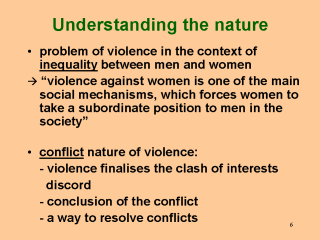| front |1 |2 |3 |4 |5 |6 |7 |8 |9 |10 |11 |12 |13 |review |
 |
At the same time liberal ideology—which is increasingly
disseminated throughout the world—declares men and women equal, which inter alia implies
the elimination of all forms of discrimination based on sexual differences. In this
context any norm (legislative or cultural), restricting women’s rights based on sexual
differences, is unjust and, therefore, actions aimed at maintenance of these
norms—including punishing women for non-compliance—are considered internationally as violence
against women. Declaration on Elimination of Violence against Women proclaimed by the Resolution 48/104 of the General Assembly on the 20th of December 1993. This means that international organisations recognise a direct relation between the problem of violence against women and inequality between men and women. Thus countries which signed the Declaration on the Elimination of Violence against Women must address the inequality between men and women. This is difficult in some countries because of deeply rooted social and cultural traditions, which restrict women’s rights. *** It is difficult to imagine a society, where there are no conflicts and difference of interests on different levels, including interpersonal levels. The positive role of conflicts in the development of a society cannot be doubted. In the family it is also impossible to avoid conflicts caused by the assignment of duties, responsibilities, and power. In the majority of cases conflicts conclude with the development of certain agreements, which each party tries to follow. However, in some cases conflict conclude in violence against woman. |